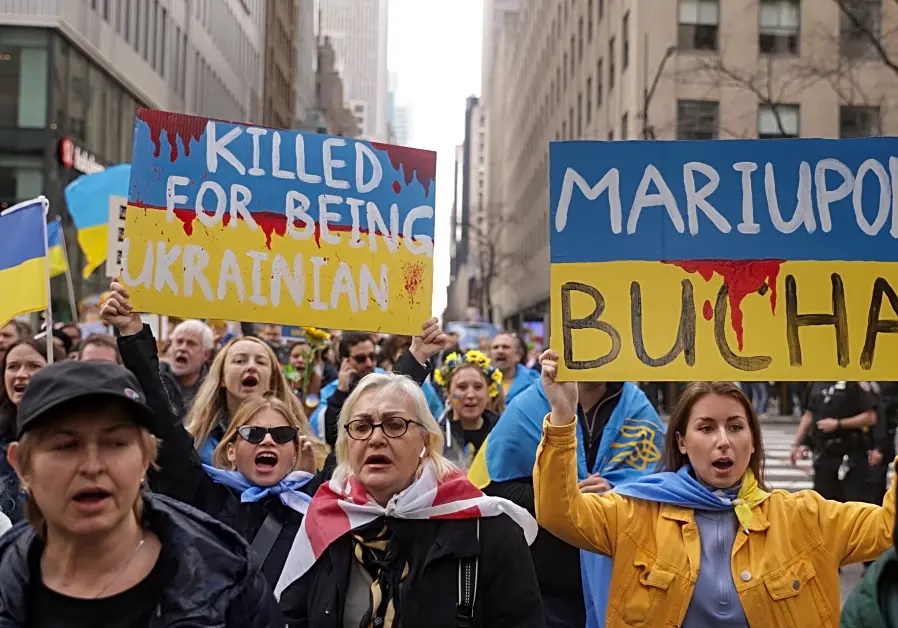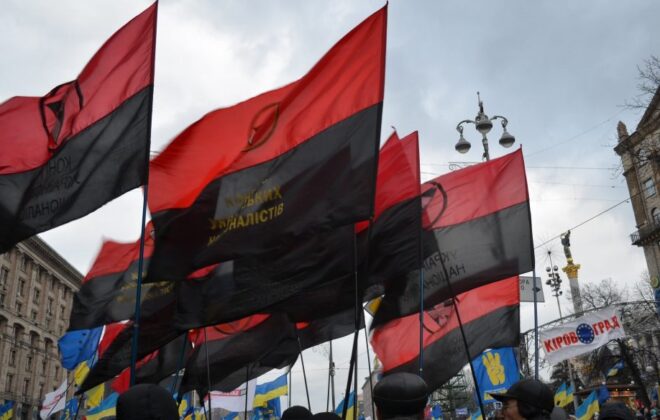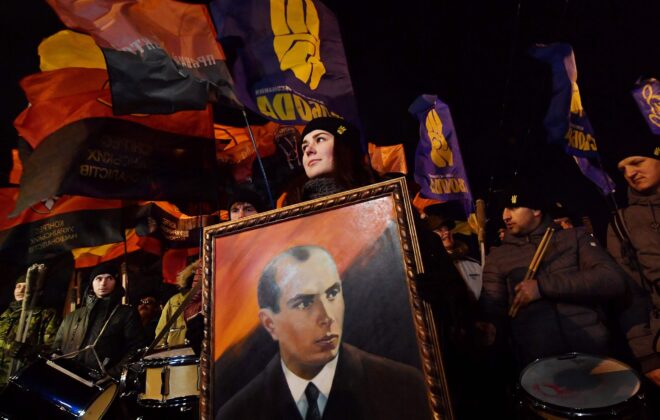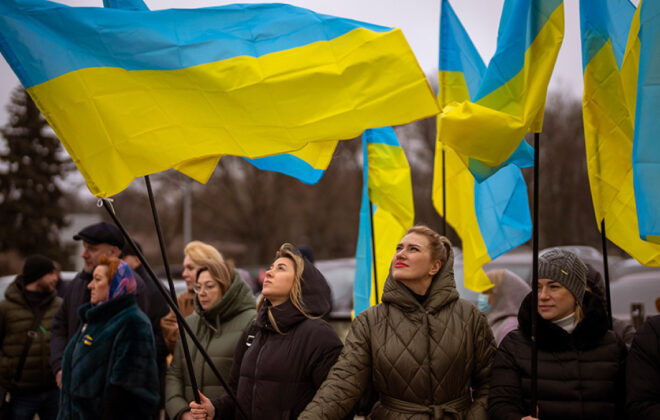The Russia-Ukraine War in Germany II. Putin’s “Special Military Operation” against Ukraine – a War of Annihilation.
Cultural genocide
Putin’s war against Ukraine is literally about Ukraine’s very existence. Control over the whole of Ukraine has probably been Putin’s goal since he moved into the Moscow Kremlin. But today, the subjugation of Ukraine is no longer enough for him: today, Putin wants the annihilation of Ukraine; he wants the erasure of the Ukrainian state from the map and the total Russification of that part of the Ukrainian population that will survive the war and the occupation in the country, that will not have been deported to Siberia and will not have fled abroad. Dmitry Medvedev, currently Deputy Head of the Security Council of the Russian Federation (soviet bezopasnosti) and former (“interim”) president, publicly expressed doubts about the future existence of Ukraine, thus consciously or unconsciously revealing the Russian war aim.
But it is not only about the Ukrainian state; it is about the national identity of Ukrainians. The aim of the war of extermination is the eradication of the Ukrainian language, the eradication of Ukrainian culture, and the eradication of Ukrainian history – a cultural genocide. This aim explains the targeted attacks on Ukraine’s material cultural heritage and the destruction of churches, museums, archives, and monuments. For example, after taking Mariupol’, the Russian occupiers burned books from the library of the Petro Mohyla Cathedral, among them unique Ukrainian-language works. The “book burning” took place at the behest of a Moscow delegation of the Russian Orthodox Church. Local collaborators were instructed to pray for the Russian soldiers.
Putin’s war against Ukraine is also a colonial war in the tradition of the Russian Empire. In Putin’s imagined world, Ukraine is part of the “Russian soil” (“Russkaya zemlya”) that Russia is “reconquering” in this war, as he himself said in his speech at the launch of the Russian invasion on 24 February.
And Putin’s war in Ukraine is also a proxy war, a war against the “collective West”, against the USA, and against the EU, which in his view, is a collection of “satellite states of the USA”. In an insolent letter to Washington, Putin demanded the withdrawal of American forces – especially their nuclear weapons – from Europe.
Putin’s war against Ukraine is also a war against the international order established after World War II, against the UN Charter and against international law – and against the European order established after the end of the “Cold War”, as documented in the “Charter of Paris for a New Europe” on 21 November 1990. This war is a “clash of orders”, a war of Russia against Western civilization, against the rule-based international order; it is a return to the “law of the strongest”.
Putin’s declaration of war of 24 February 2022
In his televised speech announcing the invasion of Ukraine,1 Putin justified the invasion of the neighboring country with a grotesque distortion of the truth, with a “Big Lie”: “It is about what particularly worries and concerns us, about these fundamental threats that year after year, step after step is crudely and unabashedly directed against our country by irresponsible politicians in the West. I am referring to the expansion of the NATO bloc to the east and the approach of its military infrastructure to Russia’s border. […] The war machine is on the move, and, I repeat, it is approaching our borders.” Over the past 30 years, he had persistently and patiently tried to reach an agreement with the leading NATO countries on the principles of equal and indivisible security in Europe, Putin said. Instead, they (the Western powers) had broken the promise to our country not to expand NATO one inch further east. “I repeat: they have deceived us”. They have created “…on the territories bordering us – I stress, on our own historic territories – an “Anti-Russia” hostile to us […] placed under complete control from outside, and intensively used by the armed forces of NATO countries and pumped full of the latest weapons.” For the US and its allies, this is a so-called “policy of containment” of Russia; but for our country, it is ultimately a question of life and death, a question of our historical future as a nation […] The leading NATO countries, in order to achieve their own goals, support extreme nationalists and neo-Nazis in Ukraine […] They will, of course, take the war to Crimea, as they did in the Donbas, in order to kill.”
The Donbas people’s republics had asked Russia for help, Putin said. “Circumstances demand that we act decisively and immediately.” In accordance with Article 51 of the UN Charter – the right to self-defense – and in line with the treaties of friendship and assistance ratified by the (Russian) Federation Assembly 2 with the Donetsk People’s Republic and the Lugansk People’s Republic, he had decided to conduct a “special military operation” (in Ukraine).
“We do not intend to occupy the whole of Ukraine, but to demilitarize it,” declared the notorious liar Putin; (experience shows that the exact opposite of what Putin says is the case). The aim of the Russian “special operation”, he said, was to protect the people who had been mistreated and murdered by the Kyiv regime for eight years. “To this end, we will seek to demilitarise and denazify Ukraine and bring to justice those who committed numerous bloody crimes against civilians, including Russian citizens.”
Russia cannot feel safe, develop and exist if it is constantly threatened by Ukraine, Putin argued – a casus belli that cannot be surpassed in absurdity. The real point is that Russia cannot develop into a great empire again unless it reconquers Ukraine.
Then Putin addressed the Ukrainian military: “The Ukrainian military has sworn allegiance to its people – not to the anti-people junta that is plundering Ukraine”. “Dear comrades!” he appealed to the Ukrainian soldiers. “Your fathers, grandfathers, and great-grandfathers did not fight against the Nazis to defend our common fatherland so that today’s neo-Nazis could take power in Ukraine. I call on you not to carry out criminal orders, to lay down your weapons immediately, and go home. All soldiers of the Ukrainian army who comply with this demand may leave the war zone and return to their families without hindrance.”
“We respect the sovereignty of all newly emerged countries in the post-Soviet space,” Putin proclaimed. However, the “New Independent States” know that Putin means the opposite. In the case of Ukraine, Putin himself has exposed his lie by invading this country.
The enemy, the US, is an “empire of lies”, Putin ranted; this is what American politicians, political scientists, and journalists themselves write and say, he claimed. “The heart of the politics of the empire of lies is, above all, brute force.” With these words, Putin described the two cornerstones of the Soviet and of his own regime: namely, lies and violence.
And in unparalleled hypocrisy, the dictator Putin, who seeks to maintain his power through lies and violence, proclaims “that true power lies in justice and truth, which are on our side.”
Turning to the West, Putin threatened, “Now a few important, very important words for those who might be tempted to interfere from the side. […] Whoever tries to obstruct us […] must know that Russia’s response will be immediate and will lead to consequences they have never experienced in their history.” It is not clear whether Putin was already hinting at the possible use of nuclear weapons with these words or whether he was merely threatening the Europeans with a cold winter.
Why now?
Like in 2014, when he took advantage of the temporary impotence of the Ukrainian state (as a result of the change of power in Kyiv) and annexed Crimea without encountering serious countermeasures from the West,3 President Putin seems to have seized an opportunity in 2022 that seemed favorable to him. Speculative answers to the question “Why now?” could lie in the following – presumed – perceptions:
The US is weak, its president is an old man, and it is politically divided. The withdrawal of the world’s most modern army from Afghanistan, where it could not defeat the “barefoot” Taliban in 20 years of war, was tantamount to an escape. And besides, the US is tired of its role as “world policeman”, it is assumed in the Kremlin.
NATO is “brain dead”, French President Emmanuel Macron stated in an interview with the English magazine “The Economist” in November 2019. Yet Putin insists that Russian security interests are threatened as a result of NATO’s encirclement of Russia: In reality, the narrative of “encirclement” is merely a pretext for Russia’s planned westward expansion, specifically a pretext to justify the intended conquest of Ukraine.
After the end of the Cold War, NATO seemed obsolete. Its eastward expansion did not pose a threat to Russia – at most, Moscow was (rightly) irritated by US-American solo efforts such as the planned construction of a national US-American (not “Euro-Atlantic”) missile defense system in Poland and the Czech Republic. (Incidentally, this American operation was also conducted under a pretext, namely defense against Iranian missiles aimed at the USA).
The real reason for the vehement rejection of Ukraine’s admission to NATO is not the security implication of NATO’s presence directly on Russia’s western border. The alleged threat to Russia by the Western defense alliance is a pretextual reason: not because Russia feels threatened by NATO’s eastward expansion, but because it stands in the way of Russia’s westward expansion, specifically the annexation of Ukraine, Moscow pretends that Russia’s security is threatened by NATO.
Yet 30 years after the end of the Cold War, NATO has regained its raison d’être, indeed its need to exist – through Russia’s war of aggression against Ukraine. In itself, Russia should be interested in the slow demise of the “brain-dead” NATO; instead, Putin has revived NATO. In the NATO-Russia Founding Act of 1997, NATO had committed itself not to permanently station military forces in countries that would join NATO after 1999; Russia is now forcing NATO to revoke this commitment.
The European Union is not “united”; there have been substantial disagreements between Brussels and the capitals of some member countries (notably Budapest and Warsaw) for various reasons. Anti-European national populism is spreading in all member countries. In the weeks before the threat of a Russian war of aggression on Ukraine, there was no clear commitment to support Ukraine in a case of military emergency. Instead of deterrence, the EU’s leading heads of state and government – like the British and French prime ministers in 1938 – practiced “appeasement”, placating the dictator in the Moscow Kremlin who was determined to go to war: for Putin, a demonstration of weakness.
And in the “collective West,” there was considerable tension between the United States of America and the European Union, which seemed to weaken the transatlantic alliance.4
In view of the discord and half-heartedness on the part of the West, Putin thought he could undertake a blitzkrieg – a “special military operation,” as he has the war officially called – without encountering serious Western opposition. The opportunity seemed favorable, as with the annexation of Crimea in 2014 – especially as the “Beijing 2022 Olympic Games” (04 – 20 February 2022) diverted world attention. After all, he waited for them to end before starting the invasion of Ukraine.
Putin’s misjudgments
Misjudgment of the unity of the West.
Visible to the whole world, however, Putin’s war of aggression against Ukraine achieved the opposite of what he expected to achieve.
The aged president of the USA, Joseph (“Joe”) Biden, proved to be – despite an initial restraint that placated the American worries (see below) – the most determined and energetic opponent of Putin and the “healer” of American-European “fractures”. The widespread critical attitude towards the USA in Europe5 up to 24 February 2022 (to which, however, US administrations (Lyndon B. Johnson, Richard Nixon / Vietnam 1955 -1975; George W. Bush / Iraq 2003 – 2011 and Donald Trump in every respect) have made a lasting contribution) gave way to a new unity in the face of the Russian invasion of Ukraine. Putin’s expectation of being able to drive a wedge between (Western) Europe and (North) America proved to be deceptive. Since taking office, American President Biden has sought to close ranks with “Europe” once again. Transatlantic relations are now closer than at any time since the end of the Cold War; Russia’s war of aggression against Ukraine has welded together the recently fragile Atlantic defense alliance.6
Putin misjudged NATO’s vitality; the North Atlantic Treaty Organization turned out not to be “brain dead” at all. At its summit in Madrid on 29 June 2022, NATO updated its “Strategic Concept” (last time in 2010) with a fundamental shift in priorities and a new perception of threat: NATO identified Russia as “the most significant and direct threat” to peace and security of its member countries in the face of Russian aggression in Ukraine. (China was classified as a “strategic challenge” for the first time in Madrid).
In the face of Russian aggressiveness, even Sweden, which has been neutral for 200 years, and Finland are taking refuge under NATO’s protective umbrella; both countries were welcomed in Madrid. Finland became NATO’s 31st member on 4 April 2023.
And the European Union, which – out of “consideration” for Russia – has stalled Ukraine’s desire for membership for two decades with hollow phrases – such as those about the “open door” and Ukraine’s “belonging to the European family”7 – and did not even want to grant it the prospect of eventual membership in the preamble of the agreement on its association, decided after the Russian invasion to grant the victim of military aggression the status of an “accession candidate”. At its summit on 23 June 2022, Ukraine was officially admitted to the circle of accession candidates with the (long overdue) unanimous decision of the 27 member states. President Selenskyj had repeatedly demanded such a message from Brussels in view of the Russian war against his country – also to show the more than 40 million Ukrainian citizens that the fight for freedom is worthwhile.
The “Euro-Majdan” in the winter of 2013 / 2014 was the most impressive demonstration “for Europe” in the entire history of the European Union. No candidate deserves admission to the EU more than Ukraine.
In his assessment of the West’s reaction to its war of aggression against Ukraine, Putin was deceived by his experience in the cases of his annexation of Crimea, which was contrary to international law, and his covert aggression in the Donbas; both times the West had settled for completely ineffective personalized and economic sanctions.
Misjudgement of Ukraine’s will to assert itself.
Apart from these misjudgments regarding the unity and determination of the West, Russian President Putin (as well as the West, by the way) underestimated Ukraine’s will and ability to resist, the fighting spirit and fighting strength with which the Ukrainians are resisting the Russian attack.
With regard to the hot “reception” of the Russian (“liberation”-) army in Ukraine, Putin may also be a victim of misinformation from his advisors (e.g., Sergei Karaganov), his agents on the ground and from “pro-Russian” Ukrainian politicians (e.g., Viktor Medvedčuk).
Self-deception cannot be ruled out either: Putin’s idea of Russians and Ukrainians as “one people” does not correspond to reality. Putin has probably never understood the changes in Ukrainian society since the independence of the Ukrainian state: The outward orientation of the majority of the Ukrainian population towards the West and the accompanying turning away from Moscow, the internalization of democracy – even if it is (still) deficient – is reality. Putin possibly believed himself that Ukraine wanted “reunification” with Russia – or else he did not care, just as he is indifferent to the fate of the Russian people.
Putin’s reference to the common origin of Russians and Ukrainians (and Belarusians) is not wrong. But since the Mongol invasion of the “Old (Kievan) Rus'” (Mongol’skoe našestvie na Rus’) and the subjugation of the East Slavic principalities by the Mongols and Tatars more than 8 centuries ago (1237 – 1240),8 they have grown apart – the (ancestors of present-day) Ukrainians under Polish-Lithuanian (and later Habsburg) influence, the (ancestors of present-day) Russians in symbiosis with the Mongol Golden Horde.
Because Ukraine does not want to be the “younger brother” of the “bigger brother” (grammatically, they are “sisters”), Putin acts according to the motto: “And if you don’t want to be my brother, then I’ll smash your head in” – and pursues the subjugation of Ukraine under Moscow’s rule with military force.
Ukraine – no Choice between “War and Peace
Independence was virtually given to Ukraine in 1991 with the dissolution of the Soviet Union. Now Putin’s neo-imperial Russia is forcing a real war of independence on Ukraine.
Ukraine does not have a choice between war and peace. For Ukraine, this war is about being or not being, literally about its existence. If Russia wins this war, Ukraine will not live on amputated – as Germany did after the lost world wars; Putin will wipe Ukraine off the map.
And Putin is determined to win his war in Ukraine. He wants to finally eradicate the democratic source of infection in Ukraine, which has been a source of contagion for Russia since the Orange Revolution in 2004, threatening his regime; Putin is striving for a “final solution to the Ukraine question”, so to speak.
Therefore, Ukraine will fight as long as a Ukrainian man or woman (10% of the fighting force are female soldiers) is willing to fight with a gun in his or her hand.9
Consequences of a Russian victory
If Putin succeeds with his war of aggression, then war becomes a “normal” foreign policy operation again – the “continuation of politics by other means”.10 If Ukraine loses, then Putin will take his war to Moldova; Georgia will be the next target. Whether he will attack the Baltic states depends on the credibility of NATO’s deterrence. Putin’s army must therefore be brought to a halt on the battlefield in Ukraine with the combined forces of Ukraine (fighters) and the West (weapons).
If Russia “wins” this war, Ukraine will not only have lost it; Ukraine will literally be “lost”. Putin will turn Ukraine into an “Archipelago Gulag”11. The number of refugees proves how real Ukrainians think this prospect is: as of mid-June 2022, 6 million Ukrainians, mostly women and children,12 have fled to the West; by the end of 2022, the UNHCR expected 8.3 million – a fifth of the country’s population.
Fußnoten
- ZEIT ONLINE; 24. February 2022 https://www.zeit.de/politik/ausland/2022-02/wladimir-putin-rede-militaereinsatz-ukraine-wortlaut.
- Russ.: Federal’noe sobranie Rossijskoj Federacii.
- See Winfried Schneider-Deters: Ukraine’s Fateful Years 2013 – 2019, Stuttgart (IBIDEM) 2022, Vol. II, Part II, pp. 161 – 380.
- Ibid
- The author admits to having also had a critical attitude towards the global hegemony of the USA.
- In spite of all the invoked equality of all NATO partner states, only the American flag flew at the meeting of NATO foreign ministers at the US airbase Ramstein on 25 and 26 April 2022, and not the German flag, although Ramstein is not an extra-territorial area, but German territory. This outward appearance alone demonstrated who would matter if an emergency were to occur – despite all the European Union’s invocation of its own defense capabilities.
- See Winfried Schneider-Deters: Die palliative Ukrainepolitik der EU. Ein Plädoyer für ein neues Denken, in: OSTEUROPA 1/2005, pp 50 – 63.
- Campaigns of Batu Khan, the grandson of Genghis Khan, in 1237 and 1238 conquests in north-eastern Rus’ (Suzdal, Vladimir, Ryazan), in 1239 and 1240 in south-western Rus’ (Černihiv, Pereyaslav and Kyiv, 1240). Moscow in north-eastern Rus’, founded in 1147 by Prince Yuri Dolgorukyj, was still an insignificant city at the time; it only became a principality in 1263; the Grand Principality of Moscow (Velikoe Knjažestvo Moskobskoe) existed from 1340 to 1547, the year in which Ivan IV proclaimed the Russian Tsardom.
- Of course, the Russian occupation forces will have no shortage of “collaborators”.
- Paraphrasing the title of subchapter 24, chapter 1, book 1 of Carl von Clausewitz’s (unfinished) main work: “On War”: “War is a mere continuation of politics by other means”.
- Alexandr Isaevič Solženicyn: Archipelago GULAG; first published in 1973.
- Men between the ages of 18 and 60 are not allowed to leave the country. Many who left the country before 24 February are returning to fight.





